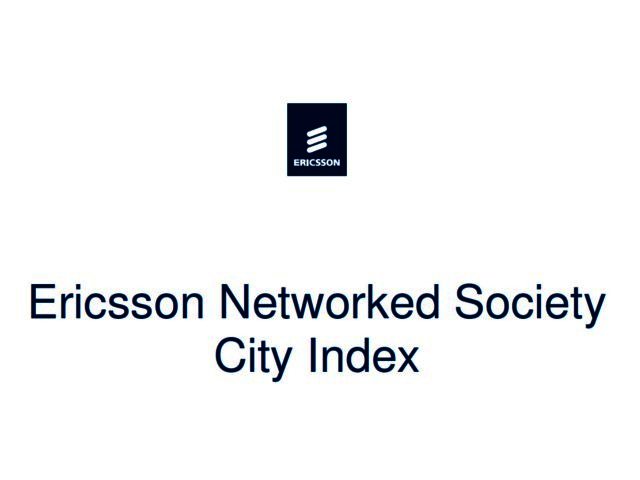PREVIOUS ARTICLENEXT ARTICLE
NEWS

Ericsson unveils its Networked Society City Index
By Staff Writer 17 May 2011 | Categories: news
Telecommunications firm Ericsson has released its Networked Society City Index, which assesses the effects and benefits of ICT maturity within a city framework.
The index covers two main dimensions, the first being a city-centric view of ICT maturity in the cities studied, looking at investments made in ICT and capturing availability, performance and usage levels for ICT. The second dimension of the index represents the benefits in terms of city attractiveness, in aspects such as healthcare, education, economic output, city efficiency and environmental for performance.
This index is the result of a joint study Ericsson conducted along with management consultancy Arthur D. Little. It shows that cities with a high level of ICT maturity are better able to manage issues including environmental management, infrastructure, public security, health-care quality and education.
City of gold gets gold medal in sub Saharan Africa
Within the Networked Society City Index, Johannesburg is the top ranked city in sub Saharan Africa and is expected to move up the rankings from number 22, upon the completion of the R1.2 billion City of Johannesburg Broadband Network Project.
Lars Linden, CEO Ericsson Africa said, “The City of Johannesburg Broadband Network Project is a great illustration of our vision of building a Networked Society in which 50 billion mobile connections will exist around the world by 2020 joining mobile phones, devices and machines and improving people’s lives.”
Launched in January 2010, the network is being built by Ericsson for its local initiative BWired and will be run in partnership with Ericsson. It will enable Johannesburg to have access to the latest innovative technology for more than a decade.
About 300 km of fibre optic cable out of the total 900 km has already been laid in various parts of the Jozi and 100 buildings are already connected, which places the project three months ahead of schedule.
This network will provide voice and data communications throughout Johannesburg, making affordable and fast broadband widely accessible to the city’s residents to stimulate socio-economic development.
Top three cities
Singapore, Stockholm and Seoul, the three top ranked cities in the index, have successfully met many social, economic and environmental targets by making extensive investments in ICT.
Singapore, for example, is aggressively driving innovation in e-health, and is a pioneer in traffic-congestion management. Stockholm views ICT as a major enabler for research collaboration and knowledge transfer, whilst Seoul is using ICT to realize green high-tech initiatives.
Following these top 3 cities are London, Paris, New York, Tokyo, Los Angeles, Shanghai and Beijing which completes the top 10 rankings in the Networked Society City Index.
This index also suggests actions for low-ranking cities, which are encouraged to provide digital access and ICT training for the underprivileged parts of their populations to reduce the digital divide.
Mathieu Lefevre, executive director of the New Cities Foundation, stated: “The ‘networked city’ is here, and it will significantly impact the life of a growing share of the world’s population. Ericsson – as demonstrated by this important new Networked Society City Index, – has grasped the significance of this mega-trend, and is positioned at the forefront of thinking on tomorrow’s urban connected planet.”
ICT NB as urbanisation rises
Today, more than 50% of the world’s population lives in urban areas. By 2030, that percentage is expected to grow to about 60. The number of megacities (cities with ten million+ inhabitants) is expected to rise to over 30 by 2030, representing an increase of about 40%.
As the number of megacities rises, key decision makers will be better able to ensure that this growth is sustainable if they can learn from the successes of top-performing cities in the Networked Society.
Erik Kruse, from the Networked Society lab at Ericsson, said: “By providing examples of how ICT can promote a city’s growth, the index can be used to inspire dialog with decision makers to use ICT to enable organisational and societal success – from economic, environmental and social perspectives.”
At the beginning of the year Ericsson also estimated that the number of mobile broadband subscriptions, devices such as USB dongles and embedded modules that use network technologies including HSPA, LTE and Mobile WiMAX, will cross the billion mark before the end of this year.
TAGS:
USER COMMENTS
Most Read Articles
Read

Magazine Online
TechSmart.co.za is South Africa's leading magazine for tech product reviews, tech news, videos, tech specs and gadgets.
Start reading now >
Download latest issue
Have Your Say
What new tech or developments are you most anticipating this year?
New smartphone announcements (46 votes)
Technological breakthroughs (29 votes)
Launch of new consoles, or notebooks (14 votes)
Innovative Artificial Intelligence solutions (29 votes)
Biotechnology or medical advancements (24 votes)
Better business applications (160 votes)



